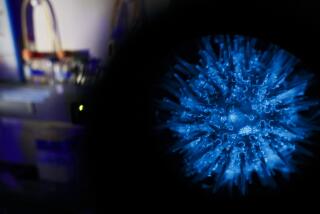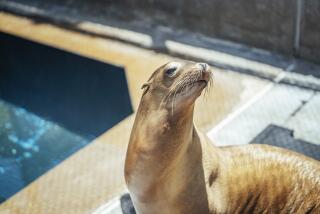Search for New Medicines Goes Undersea
- Share via
Sponges, algae and other ocean creatures are yielding new substances that hold promise as medicines against cancer, psoriasis, parasites and infectious diseases such as AIDS, scientists say.
The search for drugs from the sea focuses on organisms that lack physical defenses and therefore must produce chemicals to protect themselves against predators, said John Faulkner, a marine chemist at the Scripps Institution of Oceanography in La Jolla.
“They don’t have spines. They don’t have shells. They can’t run. They’re just a blob on the reef and they look like food but they’re not eaten,” Faulkner said. “When we see something like that we say, ‘Aha! This must be chemically protected.’ ”
Manoalides--a class of anti-inflammatory drugs derived from sponges that live near Palau in the North Pacific--are being tested on humans with psoriasis, an unsightly thickening of the skin that causes painful cracks and blistering.
Manoalides could be on the market in three or four years, and a few other drugs derived from marine creatures are expected within 10 years, said biochemist David Attaway, director of marine biotechnology at the National Sea Grant College Program in Silver Spring, Md.
Faulkner and Attaway were among 35 scientists at a workshop on drugs from the sea in May at the University of California, Santa Barbara.
“Increasingly, scientists are turning to marine organisms in their search for new pharmaceuticals because of diminishing returns from continued screening of land-based plants and animals,” UC Santa Barbara spokesman David Salisbury said.
UCSB workshop participants reported they have identified marine-derived drugs using funds from the Sea Grant program, which Attaway said has spent $700,000 to $800,000 per year on such research since 1977.
Chemist Phil Crews of UC Santa Cruz extracted two compounds from sponges near Fiji and Vanuatu in the South Pacific.
In test-tube experiments, the substances appeared effective in combatting tape worms and other parasites, including some that plague cattle and sheep. The chemicals also show some ability to fight viral diseases, and one of them can inhibit the activity of an enzyme that lets the AIDS virus reproduce itself.
William Fenical of Scripps said a number of marine bacteria show promise as antibiotics.
Jay Burgess of UCSB is studying how calcium moves and is deposited inside red algae. Attaway said that might help scientists understand and treat diseases such as arthritis and lupus.
Richard Moore of the University of Hawaii outlined efforts to use blue-green algae to produce tumor-fighting substances. Preliminary tests show “a number of very active compounds,” Attaway said.
Faulkner said the government is investigating one substance derived from blue-green algae as a possible anti-AIDS medicine. Other substances purified from sea plants or animals are being developed as possible drugs to fight fungal infections, Faulkner said.
“About 50% of the drugs in use at the moment are from natural sources,” mostly terrestrial, he said. “And a large number of the ones that are synthetic started out as a compound that was from a natural source but then was modified and improved.”
Drugs developed from living organisms include many used for cancer chemotherapy, as well as antibiotics derived from bacteria or fungi that were genetically altered, he said.
Some medicines were developed from sea creatures even before the Sea Grant program started its search in 1977. Attaway said sponges yielded a class of compounds that have anti-tumor properties and also combat certain diseases caused by viruses, including viral encephalitis, a brain inflammation.
Attaway said that, compared with land organisms, sea plants and animals yield a high “number of novel substances that prove to have some effect on a biochemical or physiological process in another organism. Those are the processes you need to control to cure or control disease.”
Faulkner said scientists search for sea-derived medicines partly by intuition. Plants or creatures that might have drugs are chopped up or soaked in alcohol to derive a crude extract, which then is tested.






